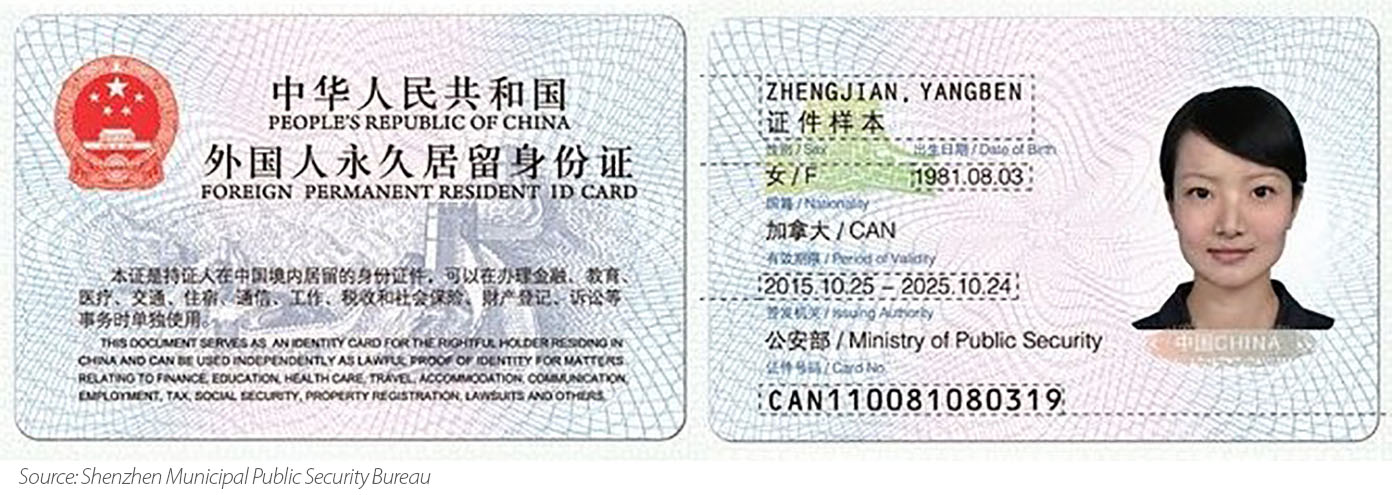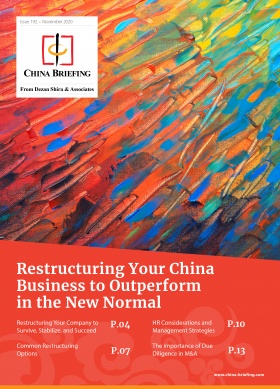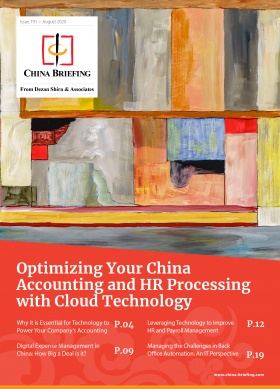China Permanent Residence Application: Explaining the Process in Shanghai
In this article, we explain China’s permanent residence application process for Shanghai. This is a part of a series of articles on China Briefing explaining Chinese Green Card policies for first-tier cities. You are welcome to read our articles for information on the permanent residence application for Beijing and Guangdong province.
UPDATE (September 20, 2023): China will issue an upgraded version of the Foreign Permanent Resident ID Card from December 1, 2023, with design improvements and enhanced functionality. Key changes include a new design with a five-star element, advanced security features, an extended 18-digit card number, and increased functionality for managing personal affairs online. The new card does not invalidate the current one, and foreigners with permanent residence status will enjoy benefits like simplified administrative processes and enhanced overall experiences in China.
UPDATE (June 5, 2023): Following the release of new criteria for permanent residence applications for working staff on May 1, 2023, Shanghai has recently updated its permanent residence application criteria for applicants with a PhD degree. Under the new criteria, all expatriates holding a PhD degree and currently working in Shanghai are eligible to apply for permanent residence. Previously, only overseas Chinese were qualified for this category. This relaxation of criteria signifies Shanghai’s increased efforts to attract more high-end and special-skilled talent to work and reside in the city.
UPDATE (May 9, 2023): According to official information given by the Exit-Entry Administration Bureau of Shanghai Public Security Bureau (Shanghai Exit-Entry Bureau), starting May 1, 2023, two significant changes have been implemented for foreigners who apply for permanent residence as working staff (one category of people who are eligible for permanent residence application in Shanghai): 1) First, the annual salary and tax payment requirement has been increased. 2) Second, a non-criminal record in China is now required, in addition to the non-criminal record in their home countries.
Due to the COVID-19 pandemic and ensuing travel bans, many foreigners working in China have begun to consider applying for a Chinese “Green Card”, or permanent residence ID card. With the card, an expatriate will be able to enter China just like Chinese citizens, without going through visa formalities.
Holders of a Foreigner Permanent Residence ID Card are not only free to enter and exit China, but also allowed to reside and work in China indefinitely. In addition, the card will bring them convenience in employment, children’s education, social security, healthcare, finance, transportation, accommodation, property purchase, and many other aspects of life in China.
This article explains the main benefits of obtaining a Chinese permanent residence ID card, the eligibility criteria for foreigners to apply for such a card in Shanghai, and the points to note when applying.
What benefits can be enjoyed by foreigners with Chinese permanent residence status?
According to the Measures on the Relevant Benefits for Foreigners with Permanent Residence Permit in China (Ren She Bu Fa [2012] No.53), in theory, foreigners granted permanent residency enjoy the same rights and bear the same obligations as Chinese citizens, except the political right and some certain rights and obligations subject to China laws and regulations.
Specifically, foreigners with Chinese permanent residence status will be entitled the following treatments:
|
Special Treatments for Foreigners with Permanent Residency in China |
|
| Category | Special treatments |
| Permanent residency |
|
| Visa-free |
|
| Work permits and residence permits are not required |
|
| Priorities in certificate application/professional title assessment |
|
| Convenience in doing businesses |
|
| Children’s education |
|
| Social insurance |
|
| Housing provident fund |
|
| Property purchase |
|
| Banking, insurance, securities, futures, and other financial service |
|
| Foreign exchange service |
|
| Transportation |
|
| Consumer activities |
|
Source: Measures on the Relevant Benefits for Foreigners with Permanent Residence Permit in China (Ren She Bu Fa [2012] No.53)
Perhaps the biggest benefit of obtaining Chinese permanent residence status for foreigners is the elimination of the cumbersome visa application procedures. With a permanent residency, a foreigner is allowed to live and work in China without any restriction – they do not need to apply for other residence and work permits, nor do they need additional visas to enter and exit China.
Although all foreigners working in China can participate in social insurance, permanent residence ID card holders enjoy more convenience in going through the formalities of transferring, continuing, or terminating their social insurance by presenting their green card.
Besides, foreigners as permanent residents are also allowed to purchase commercial apartments for self-use, without the need to have first worked or studied in China for several years. They shall still be subject to restrictions on purchasing properties in China and cannot engage in property market speculation.
Education-wise, cardholders’ accompanying children are allowed to enter a school for the nine-year compulsory education. And if they are eligible, the education department of the holder’s residence will help deal with the admission and transfer formalities following the principle of admission to neighborhood schools and will not charge fees other than those required by the state.
In terms of investment, foreigners with permanent residence are able to set up and contribute to the registered capital of a foreign-invested enterprise (FIE) by an intellectual property/intangible assets or making direct foreign investment in China with legally obtained RMB, which may reduce the investment and exchange costs.
Further, the permanent resident ID card, which is now machine-readable, can also be used in various aspects of the foreigner’s life in China, for example, in relevant boarding procedures in the case of domestic flights, purchasing train tickets of domestic trains, and handling check-in procedure at domestic hotels. The card can be used as a valid identity document to apply for a driver’s license and register motor vehicles and handle banking, insurance, securities, foreign exchange, and other financial business in accordance with regulations.
Who can apply for permanent residence in Shanghai?
The eligibility criteria for obtaining permanent residency in China vary from region to region. Big cities like Shanghai and Beijing adopt additional policies that expand the eligibility criteria and shorten the overall application time. Shanghai, as the first city to implement new measures, shortened the initial application processing time from 180 days to 90 days and included additional five categories of eligible foreigners.
Shanghai now provides 13 categories of people that are eligible for permanent residency. Basically, they can be classified in four major groups – foreign employees holding key positions in enterprises, foreign talents, foreign investors, and linear relatives of a Chinese citizen or a foreigner with permanent residency in China.
| Foreigner Permanent Residence Identity Application | ||
| No. | Applicant | Terms for application |
| Foreign employees who hold key positions in businesses | ||
| 1 | Working staff | · Worked in Shanghai continuously for 4 years;
· Stayed in mainland China for no less than 6 months every year in the 4 years; · With an annual salary income (before tax) no less than six times the average annual salary of urban employees in the previous year in the region for four consecutive years; · Paid an annual individual income tax (IIT) of not less than 20 percent of their salary; and · With present employer’s recommendation |
| 2 | Foreign staff working in Shanghai Pilot FTZ Lin-Gang Special Area | · Worked in Shanghai Pilot FTZ Lin-Gang Special Area continuously for 3 years;
· With an annual salary income (before tax) exceeding RMB 380,000; and · With present employer’s recommendation |
| 3 | Senior/Professional Staff | They have been employed in the following 5 types of organizations and hold positions of chairman, vice chairman, general manager, deputy general manager, or have titles of associate professor, associate researcher and above, and have worked consecutively for 4 years (residence in China no less than 3 years), and have good tax records:
· Research institutes of the State Council or Shanghai Municipal People’s Government or public institutions with administrative management or functions · Key universities (“211 Project” schools and the first batch of admissions colleges) · Enterprises and institutions that undertake the task of national key projects or major scientific and technological projects · High-tech enterprises, encouraged foreign-invested enterprises, foreign-invested advanced technology enterprises or foreign-invested product export enterprises · Enterprises and institutions like national laboratories, national key laboratories, national engineering laboratories, national engineering research centers, national accredited enterprise technology centers, national engineering technology research centers, or foreign-funded R&D centers |
| High-end and special-skilled talents | ||
| 4 | Core members of research teams | · Being recommended and guaranteed by foreign leading experts or pioneering researchers who have been introduced by Shanghai Zhangjiang National Innovation Demonstration Zone or Shanghai Pilot FTZ (“Double Zones”) and accredited by the Administration Committee of Double Zones |
| 5 | Special talents | · World-class talents, special skilled professionals, or celebrities who have made significant and outstanding contributions to national economic development and social progress or who have great value to the country and recommended by Ministry, Commission or Administration of the State Council, or Shanghai Municipal People’s Government;
· Foreigners who meet the criteria of high-level talent as set by the national key development zones – such as Shanghai Zhangjiang National Innovation Demonstration Zone, Shanghai Pilot FTZ, or Shanghai Pilot FTZ Lin-Gang Special Area – and are recommended by the administration committee of the said zones; or · Foreign financial talents recommended by Shanghai financial administration authorities. |
| 6 | Expatriates with Ph. Degrees | · Expatriates who have Ph. degrees and currently work in Shanghai |
| 7 | Overseas Chinese working in national key development zones, “double innovation” areas | · Overseas Chinese who work in the national key development zones, such as Shanghai Zhangjiang National Innovation Demonstration Zone, Shanghai Pilot FTZ or Shanghai Pilot FTZ Lin-Gang Special Area, or in demonstration base of “mass entrepreneurship and innovation” area for at least 4 consecutive years, and have good tax records, and who live in mainland China for no less than 6 months each year |
| 8 | Foreigners holding residence permits for work (marked “high qualified person”) | · Foreign high-level experts (talents) who are accredited by a competent national or municipal administration, or employed by science and technology innovation companies designated by a competent department of Shanghai as professionals with expertise can apply for permanent residence in China with the present employer’s recommendation if they have acquired an employment-typed residence permit noted with “Talents” and have worked in Shanghai for over 3 years |
| 9 | Excellent foreign graduates | · Foreign graduates from key domestic universities (on the List of World-Class Universities and First-Class Disciplines (“Double First-Class” initiative) released by the Ministry of Education) or well-known overseas universities [top 300 universities on Shanghai Ranking’s Academic Ranking of World Universities (originally compiled and issued by Shanghai Jiao Tong University)] who were engaged in innovative entrepreneurship in Shanghai with a residence permit for private affairs (marked “entrepreneurship”) within 2 years after graduation, became employed by eligible Shanghai organizations [① organizations in “Double Zones” or “Double Innovation” Areas; or ② organizations on the list of Shanghai scientific & technological innovative occupations formulated by the Shanghai scientific and technological innovation authorities; or ③ universities or scientific research institutes in Shanghai] during those 2 years and worked there for three consecutive years, and have good records of work performance, tax payment, and social credit may apply for permanent residence in China upon recommendation of their organizations |
| Foreigners who made a relatively large direct investment in China | ||
| 10 | Foreign investors | · Investors who invest in China and have actually submitted a registered capital of more than US$2 million (shall not be lower than this standard for 3 consecutive years);
· Investors who invest in Central China and have actually submitted a registered capital of more than US$1 million (shall not be lower than this standard for 3 consecutive years); · Investors who invest in China’s western regions and key national poverty alleviation and development counties, and have actually submitted a registered capital of more than US$500,000 (shall not be lower than this standard for 3 consecutive years); · Investors who invest in “Foreign Investment Industry Guidance Project” encouraged by the State, and have actually submitted a registered capital of more than US$500,000 (shall not be lower than this standard for 3 consecutive years); or · Investors who submit direct investment in Shanghai consistently as an individual or through the company as a controlling shareholder with individual status for three consecutive years, and whose total amount of investment reaches more than US$1 million (or US$500,000 for the “Foreign Investment Guideline Project” encouraged by the State |
| Remark: the foreign spouse and their unmarried children under 18 years old of the above foreign applicants can apply for permanent residence together. | ||
| PR Application for Family Reunion-Related Reasons | ||
| 11 | Spouse
|
Those people who are married to a Chinese citizen (having registered Chinese permanent citizenship),or to a foreigner who has the qualification for permanently staying in China can apply for permanent residence in China, if they meet all of the following four requirements:
· They have been married for 5 years; · They have lived in China for 5 consecutive years; · They have stayed in mainland China for no less than 9 months every year; and · They have stable life security and accommodations in China |
| 12 | Children | Children who are under the age of 18 years old, unmarried, and verified to have foreign nationality can apply for a Permanent Residence in China if one or both parent(s)is/are a Chinese citizen(s) (having registered Chinese permanent citizenship) or foreigner(s)who is/are eligible for permanent residence in China |
| 13 | Elderly relatives | Those who are over 60 years old can apply for a permanent residence in China, if they have no direct relatives abroad and need to live with direct relatives in mainland China, and stay in mainland China for no less than 9 months out of every year, and have stable life security and accommodations |
Many applicants may choose to apply for the permanent residence ID card as “working staff” in Shanghai. To be qualified, they must have worked in Shanghai over the past four years, stayed in mainland China for no less than six months every year, earned an annual pre-tax salary income no less than six times the average annual salary of urban employees in the previous year in the region for four consecutive years, and paid an annual IIT of not less than 20 percent of their salary, in addition to other standard requirements, such as good health, compliance with Chinese law, and no criminal record.
However, “if during the four years, the foreign employee moved to work in another city, they might be considered ineligible,” said Fuki Fu, Manager of Human Resources and Payroll Services at Dezan Shira & Associate’s Shanghai Office, adding, “for example, a foreign employee initially worked in Shanghai for two years, but then moved to work in Beijing for one year. Even if the foreigner later returned from Beijing to Shanghai and worked in Shanghai for another two years, the four years of working in Shanghai cannot be considered as continuous, and the applicant will therefore be deemed as unqualified.”
Nevertheless, “it does not mean applicants can’t change their job. If the next employer is also a company registered in Shanghai, changing employers will not interrupt the four-year rule,” Fuki clarified.
How to apply for China permanent residence?
Here are the primary documents needed for the permanent residence application:
- Complete Application Form for Permanent Residence in China;
- Valid passport and valid visa (or resident permit);
- A health certificate issued by a domestic entry-exit inspection and issued within the last six months;
- Non-criminal record abroad and in China of the applicant or the linear relative;
- Company letters, licenses, and tax payment certificates when applying for the permanent residence card through employment;
- Proof of relationship (marriage certificate, birth certificate, or proof of kinship), as well as evidence of stable housing and income if applicant is an accompanying family member;
- Previous private passport and overseas permanent resident certificate if the applicant was once of Chinese nationality; and
- If the applicant is a foreign investor – the business license, a capital verification report showing that the company’s registered capital has reached the standard, and an audit report showing this for the last three consecutive years are required.
Applicants shall submit the primary documents as well as additional materials required to the Immigration Service Center of Exit-Entry Administration Bureau of Shanghai Public Security Bureau, and the application will be processed within 90 working days (time for investigation is excluded if some items need to be investigated by the Public Security Bureau).
Given the burdensome preparation work and the ongoing travel bans, it is advisable that applicants reach out to a local specialist to handle the application process.
Why some people hesitate to apply?
Many foreigners have concerns over getting a Chinese Permanent Residence ID Card, as they are not sure whether this will impact their tax residency status in China, or whether they will have a worldwide taxation obligation in the country.
In fact, foreigners’ tax residency status depends on whether the individual has a domicile in China and how long they have been resided in China. Without a domicile in China, according to the “six-year rule”, foreigners who reside in China for six consecutive years (for at least 183 days each year) will be subject to taxation on their worldwide income. Therefore, the Permanent Residence ID Card will not directly determine a change in their tax residency status. To understand more about it, You can visit our article on the Tax Implications for Chinese Permanent Residence ID Card Holders.
Foreigners with permanent residence status should perform the corresponding tax payment obligations in accordance with China tax laws and regulations as well as the international treaties and agreements on tax concluded between China and other countries.
To be noted, “obtaining a foreign permanent residence ID card doesn’t mean the card can be permanently kept by the holder. If the card holder committed illegal acts in China, the Ministry of Public Security has the power to revoke their permanent residence ID card. Foreigners should always abide by the laws while living in China,” Fuki reminded.
As a professional business service provider, Dezan Shira & Associates can provide you necessary support in assessing your eligibility and feasibility, as well as processing your application for a Chinese permanent residence ID card. Please contact us without hesitation or email us at Fuki.Fu@dezshira.com or China@dezshira.com
(This article was first published on June 9, 2021 and was last updated on September 20, 2023.)
About Us
China Briefing is written and produced by Dezan Shira & Associates. The practice assists foreign investors into China and has done so since 1992 through offices in Beijing, Tianjin, Dalian, Qingdao, Shanghai, Hangzhou, Ningbo, Suzhou, Guangzhou, Dongguan, Zhongshan, Shenzhen, and Hong Kong. Please contact the firm for assistance in China at china@dezshira.com.
Dezan Shira & Associates has offices in Vietnam, Indonesia, Singapore, United States, Germany, Italy, India, and Russia, in addition to our trade research facilities along the Belt & Road Initiative. We also have partner firms assisting foreign investors in The Philippines, Malaysia, Thailand, Bangladesh.
- Previous Article Key Takeaways From the China-Central Asia Cooperation Forum
- Next Article China Company Name Registration: New Measures Clarify Standards and Application Procedures









